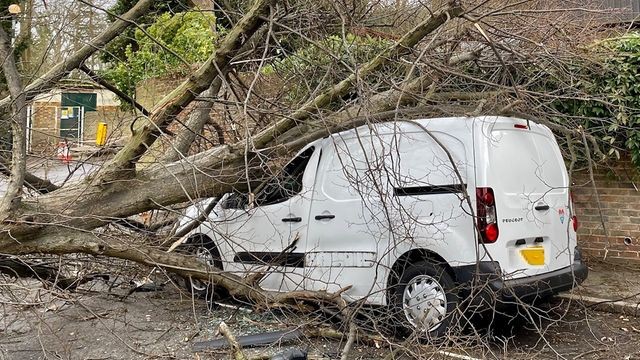Category: Blog
Reskube Raises £500,000 to Take Its Pioneering Remote Working Resilience Technology Global

Reskube leading the charge with its innovative remote-working resilience solution, has successfully raised £500,000 via a crowdfunding campaign as featured in Enterprise Talk.
The funding round opened in February, with over £500,000 raised in under six weeks. It followed a successful 12 months during which the company’s signature product, Reskube Home, won the prestigious BCI Global Continuity and Resilience Innovation Award. Having enjoyed early success domestically, Reskube now aims to take on power and internet poverty around the world, not least in the likes of South Africa and USA where power interruptions are commonplace.
Andrew Lawton, CEO of Reskube, comments: “We are delighted to have hit our crowdfunding target of £500,000 in under six weeks. This is a significant milestone for us. Unbroken connectivity should no longer be a luxury, but a necessity – yet for millions it remains a global postcode lottery.
Power and internet outages affect us far beyond the home office. From leisure pursuits like camping and gaming, to vital operations such as doctor surgeries and mobile medical centres in emergency zones, the breadth of use for this technology is enormous.
This investment will allow us to bring our innovative technology to the global markets which need it most. It takes us one step further towards bridging the connectivity gap and ensuring equal reliable access to internet and power.”
Join our mailing list!
Share this article
Popular posts
Zoom Fatigue? Here’s Our Prescription.

One of the most frustrating aspects of homeworking is a poor or unreliable internet connection, which can lead to missed deadlines, communication breakdowns, and decreased productivity.
From video call freezes during a team meeting to internet lag that makes conversations impossible to continue, unreliable connectivity can be a real productivity killer. This problem is so widespread that researchers at the Stanford Virtual Human Interaction Lab have labelled it “Zoom fatigue.” The frustration of experiencing a poor internet connection is real, and it can lead to decreased motivation and job dissatisfaction.
However, there is a solution to this problem – Reskube. Reskube is a compact device that offers office-grade IT infrastructure for the home. It is designed to keep you and your team online throughout the day when it’s WFH day. Reskube is resilient enough to withstand WIFI disruptions and provides an uninterrupted power supply and a stable internet line for itself and any attached devices. It ensures connectivity is always seamless, so you can focus on your work without worrying about dropped calls or lagging internet speeds.
Reskube is an award-winning device that has been voted “Most Innovative Product of the Year” at the 2022 BCI Global Awards. Its cutting-edge technology and sleek design make it the perfect solution for those who want to improve their WFH experience. Reskube is easy to set up and use, and it doesn’t require any technical expertise. It’s the ideal device for busy professionals who want to stay connected, collaborate, and succeed.
WFH can be exhausting and tiring, especially when you’re dealing with unreliable internet connectivity. However, with Reskube, you can banish those Zoom blues and enjoy seamless connectivity all day long. Reskube offers a reliable internet connection, uninterrupted power supply, and stable internet line, ensuring that you and your team can stay connected, collaborate, and succeed. So, if you’re looking for a solution to your WFH connectivity woes, Reskube is the answer.
The regulator’s statement last year cemented their view that operational disruptions are a clear and present threat. What classifies as an operational disruption is broad, from system failures to security breaches to governance and oversight issues. In their opinion, they can cause wide-reaching harm to consumers, pose a risk to market integrity, threaten the viability of firms and ultimately cause instability in the financial system.
This regulatory focus proves that resilience is a key issue for both the FCA and PRA as well as the Bank of England. The impact of the pandemic on ways of working in the sector has only exacerbated this. For example, forcing many workers in mission critical or time-sensitive roles to work remotely. Particularly during a period of increased market volatility.
This change in working habits has given rise to a growing risk to operational resilience that firms can’t afford to overlook: the threat of internet and power outages disrupting remote workers.
The government’s work from home guidance, enforced during the more difficult moments of the pandemic, may have ended for now. But the fact remains that a shift has occurred. Many City firms have retained flexible working policies, and plan to do so long term. That means many thousands more people doing mission critical or time-sensitive work, often making complex and important decisions, away from the ‘safe’ surroundings of the traditional office.
But are the firms experiencing this change in working setup alive to the risks this poses? If not, they should be. Staff working remotely are at risk of severe disruption if internet or power supply drops. And these are regular occurrences. Recent events provide ample evidence of this, from the disruption caused by Storm Eunice to the looming threat of conflict in Europe which would impact energy supply. And of course, we may yet witness another virulent COVID variant which turns remote working back into a requirement rather than a choice.
Not only can home connectivity issues cause costly delays, it’s also a potential security risk if workers try to get round outages by relying on less secure backup options.
The new regulatory requirements don’t end on 31st March. As soon as possible after that date, and no later than 31st March 2025, firms must have performed mapping and testing so that they are able to remain within impact tolerances for each important business service. Firms must also have made the necessary investments to enable them to operate consistently within their impact tolerances.
It is imperative that before the March deadline, as part of their mapping exercise, financial services firms consider the threat of internet and power outages to their business continuity and overall resilience and report it as part of their assessment. Failure to do so could be costly.
Join our mailing list!
Share this article
Popular posts
Reskube Launches Crowdfunding Campaign For its Remote Work Tech

Reskube has been featured in Startups Magazine as they promote the new funding round. The round follows a successful 2022 in which Reskube’s signature product, Reskube Home, was awarded the prestigious BCI Global Continuity and Resilience Innovation Award. Having enjoyed early success domestically, Reskube now wants to tackle power and internet poverty on a global stage, particularly in areas like South Africa and USA who are frequently dealing with power interruptions.
The funding round opens today (21st February) and early interest has been extremely high, with £688,000 committed pre-launch.
Andrew Lawton, CEO of Reskube Ltd, commented: “We’ve been delighted with our success to date, but the truth is we’ve barely scratched the surface. At a time where remote working is becoming the norm, along with the increased threat of power and internet disruption worldwide, it is crucial that remote setups are resilient enough to withstand any challenges they may face.
“Beyond that, this gets even more exciting because the potential application of an all-in-one power and internet solution, which guarantees unbroken access when most needed, is vast. From petrol forecourts and retail to gamers and campers and further to doctor’s surgeries and mobile medical centres in emergency zones. The list goes on.
“Our British success story is only just beginning. As we continue to evolve our innovative technology and enter new markets, we are extremely excited to launch this new funding round. Early interest has shown that others can also see the great opportunity that we have in front of us. There is still plenty of time for investors who want to help us end internet and power poverty.”
Join our mailing list!
Share this article
Popular posts
Reskube Takes Home ‘Most Innovative Product of the Year’ at the 2022 BCI Global Awards

We are excited to announce that Reskube won the Continuity and Resilience Innovation award at the BCI Global Awards last week!
Reskube has transformed along with our hybrid workforces to build resilience within key staff homes and small offices, so you can continue your best work without disruption.
In our current climate, enterprise-grade seamless connectivity and an uninterrupted home power supply has never been more critical.
If you would like to see Reskube in action, please do let me know or schedule your free demo here.
Join our reading list!
Popular posts
Deadline Looming For Financial Services Firms to Demonstrate Operational Resilience

31st March 2022 represents an important regulatory deadline for financial services firms in the UK. Last March, the Bank of England and FCA released their Operational Resilience Policy Statement. It requires that, by this date, UK financial services companies must have demonstrated that they have identified their important business services, and any vulnerabilities in their operational resilience.
The regulator’s statement last year cemented their view that operational disruptions are a clear and present threat. What classifies as an operational disruption is broad, from system failures to security breaches to governance and oversight issues. In their opinion, they can cause wide-reaching harm to consumers, pose a risk to market integrity, threaten the viability of firms and ultimately cause instability in the financial system.
This regulatory focus proves that resilience is a key issue for both the FCA and PRA as well as the Bank of England. The impact of the pandemic on ways of working in the sector has only exacerbated this. For example, forcing many workers in mission critical or time-sensitive roles to work remotely. Particularly during a period of increased market volatility.
This change in working habits has given rise to a growing risk to operational resilience that firms can’t afford to overlook: the threat of internet and power outages disrupting remote workers.
The government’s work from home guidance, enforced during the more difficult moments of the pandemic, may have ended for now. But the fact remains that a shift has occurred. Many City firms have retained flexible working policies, and plan to do so long term. That means many thousands more people doing mission critical or time-sensitive work, often making complex and important decisions, away from the ‘safe’ surroundings of the traditional office.
But are the firms experiencing this change in working setup alive to the risks this poses? If not, they should be. Staff working remotely are at risk of severe disruption if internet or power supply drops. And these are regular occurrences. Recent events provide ample evidence of this, from the disruption caused by Storm Eunice to the looming threat of conflict in Europe which would impact energy supply. And of course, we may yet witness another virulent COVID variant which turns remote working back into a requirement rather than a choice.
Not only can home connectivity issues cause costly delays, it’s also a potential security risk if workers try to get round outages by relying on less secure backup options.
The new regulatory requirements don’t end on 31st March. As soon as possible after that date, and no later than 31st March 2025, firms must have performed mapping and testing so that they are able to remain within impact tolerances for each important business service. Firms must also have made the necessary investments to enable them to operate consistently within their impact tolerances.
It is imperative that before the March deadline, as part of their mapping exercise, financial services firms consider the threat of internet and power outages to their business continuity and overall resilience and report it as part of their assessment. Failure to do so could be costly.
Share this article
Popular posts
What Did We Learn From Eunice?

What Did We Learn From Eunice?
Eunice was one of the most ferocious storms in England in 20 years. It wreaked havoc across a large swath of the country, replicating what had happened in Scotland with storm Arwen a few months before. Both storms killed and both storms brought widespread power outages.

Scientists tell us that although we should not expect more storms, we should expect the storms we do have to be more powerful and more impactful. This is due to the increase in energy and the amount of water they carry as a result of climate change.
My own power went out at 11am on Friday 18th.
I was in the middle of a Zoom call, like millions of others, I am sure. My laptop did not like it however, and although the battery was fully charged it shut down for a few seconds, dropping me off the call.
When it came back to life it had lost the correct date which took time to fix.
The broadband had also gone with the power and so I had to tether to my phone. This is something that I had done a thousand times when my remit was Europe, Middle East and Africa and on the road, but when it mattered it would not work. It took a good few minutes of trying before I managed to get connected.
Then a couple of minutes more to get back on the call. Fifteen minutes in total.
I am pretty technical and others may have had even more trouble. My call was also an internal call on a non-urgent operational matter and so 15 minutes was not too critical.
Had my work been critical or my activity time focused things would have been very different.
A further surprise awaited me. Teams eats battery life! My top of the range laptop with a supposed battery life of a day ran down in 2 hours.
So, by 1pm I would have been stuck but for the fact I had a fully charged Reskube to hand. I was kicking myself for not setting it up. If I had, I would not have noticed a thing as the power and broadband failed, but I could have carried on regardless.
I had just brought it back from a customer demo the day before and it sat beside my desk instead of under it. That won’t happen again!
So, I plugged my laptop and screen in to the Reskube and carried on working for the rest of the day without problem despite the lack of mains power.
I do know that my neighbours were not so lucky, and that they had to stop working when their laptops gave in so wasting a critical afternoon as they worked to an important deadline. A high value individual leading a team unable to work.
Our local businesses were also affected. The pubs and shops lost significant business as it was unable to take cards as its point of sale was without electricity. Nobody carries cash these days of course.
Our local supermarket had to throw away close to £1M of stock as the refrigerators and freezers were left without power for over 5 hours.
As I write, on the Sunday evening two and a half days later, our neighbourhood is still in darkness. We may not have power tomorrow morning when we will be expected to be at work.
We could try to get into the office but trains are also disrupted. A dilemma.
Unfortunately, with increasingly powerful storms and the threat of war in Europe resulting in shortages of gas and oil there is a greater risk of power cuts in the near future.
We need to plan for this.
So, what have we learned from Eunice?
1. Laptop batteries do not work like UPSs.
2. Tethering a laptop to a phone does not work every time and often not when you most need it. It cannot be relied on in critical situations, particularly if staff are not technical.
3. Ultimately, what we have learned is that if we or our staff are doing high value or business critical work at home we must think about the infrastructure our businesses provide so we remain in control and able to do our best work uninterrupted.
Reskube Takes Home ‘Most Innovative Product of the Year’ at the CIR Business Continuity Awards 2021


Reskube Takes Home ‘Most Innovative Product of the Year’ at the CIR Business Continuity Awards 2021

Champagne corks were popping after our remote working resiliency solution was named ‘Most Innovative Product of the Year’ at the prestigious CIR Business Continuity Awards 2021. Since Reskube launched at the start of this year it has quickly become a frontrunner and made its mark on the business continuity and resilience industry.
Reskube founder Andrew Lawton remarked, “To say we are thrilled to be honoured with this award would be a huge understatement. It is validation of the entire team’s hard work. Massive thanks to the fantastic Reskube team, our wise board and, of course, our wonderful supporters who recommended us.”
Join our mailing list!
Building Resilience and Security for Long-Term Remote Working

Building Resilience and Security for Long-Term Remote Working

This week Steve Dance and Andrew Lawton discuss the risks we need to address as working remotely becomes a more popular option for organisations across the UK.
Working from home is now a regular and accepted arrangement for many organisations. The COVID-19 pandemic forced many organisations to quickly adapt to remote home-working to keep their business running. And the experience has forced the subject of resilience onto many boardroom agendas. In the UK financial sector, operational resilience is becoming a regulatory requirement as the Bank of England, Prudential Regulation Authority, and the Financial Conduct Authority press on with their initiatives on financial sector resilience. Given the number of financial institutions that are announcing their intention for remote working to be ‘business as usual’, security and resilience for remote working arrangements will fall under the auspices of these new regulations. At a national level rumours are circulating that the UK government is considering a ‘right to work from home’ initiative. In all likelihood, we may never return to working in the office five days a week. We are more likely to move to a hybrid arrangement with the corporate office used as a meeting and collaboration space, while the home office is used for day-to-day work.
However, for many organisations, relying on average domestic provision for security and resilience can significantly dilute (and even compromise) the overall security position of the organisation. Even though remote working may be focused on routine work, the work performed may still be time critical or involve handling sensitive or confidential data.
Remote workers will often deal with sensitive data that may be confidential to themselves, their customers or their companies and so need protection from hackers penetrating their home networks. The security and resilience of the ‘home office’ can jeopardise both the domestic and the corporate environment. In adopting a regular work from home arrangement, several threats to both security and resilience present themselves:
- 1. Physical compromise of the workplace. Utility failure and property damage due to extreme weather can limit an individual’s ability to access IT services. Power failures can last for hours and possibly days – impacting operational deadlines.
- 2. Remote workers are exposed to single points of failure in their home broadband, Internet and home power supplies. Around 4.7 million people in the UK suffered a broadband outage lasting more than 3 hours during the past year with an estimated cost to the economy of some £1.5bn. Events such as the August 2019 power cut, which cut power to 1.1 million households, create headlines but every single day 1000s of homes are left without power.
- 3. Absence of enterprise grade firewalls and blacklisted IP management. Most remote access solutions are outside of perimeter defences and may rely solely on security features of domestic devices (i.e., broadband routers).
- 4. Unprotected and vulnerable devices that are attached to the local network. This is almost guaranteed – home networks support several different devices, many of which will be unknown and unproven to the organisation’s information security specialists.
- 5. Lack of control over devices added to the local network. There is very little that can be done in terms of preventing additional, unsecured devices from being attached to the home network.
The average home network, then, is full of potential security trip-wires. There are, of course, solutions to all the threats outlined above, but they too have deployment issues that can be difficult to manage:
- 1. Solution ‘silos’. Mitigating the threats may require several ‘point’ solutions for each threat. Is it practical or desirable to secure remote workers in this way? And can the level of security be maintained consistently?
- 2. End user ability to apply and maintain security solutions. If several solutions are required to mitigate threats is it reasonable to expect end-users to deploy and manage things like micro-UPS systems and security software? Under a scenario where domestic broadband is lost, relying on an end-user (who may be under pressure to meet a deadline) to perform recovery of connectivity via mobile services is asking for trouble. Security needs to be both pervasive, persistent and ‘baked-in’.
- 3. Management and support of remote workers. Service and help desks need to have tools to effectively deploy, monitor, and support security solutions – in essence, they need a management console to ensure that home workers are working in a secure environment.
To overcome the security concerns and ongoing management challenges remote working requires a more holistic approach to reliably implement security and resilience for the home worker. Many organisations are now looking for solutions to overcome the drawbacks of security silos and management challenges. Best of breed integrated solutions will incorporate:
- 1. Integral UPS to ensure critical work is not interrupted by power outages or surges.
- 2. Security features to force security of sensitive traffic.
- 3. Automated failover to secure mobile data services to preserve connectivity, in the event of domestic broadband failure
- 4. Enterprise grade management capability providing visibility and control to simply support remote workers via a single console.
This article was first published on Continuity Central and has been written by Steve Dance who is an independent consultant specialising in business continuity and operational resilience at RiskCentric, and Andrew Lawton who is CEO of ResKube.
Reskube Gets Shortlisted For CIR Business Continuity Awards 2021


Reskube Gets Shortlisted For CIR Business Continuity Awards 2021
“What great news!” says CEO Andrew Lawton,”It is great that the team’s hard work, experience and continuous innovation are being recognised”.
First introduced as a response to the changed world of work resulting from the 2020 global COVID-19 pandemic, ResKube provides a simple, cost effective, single device to provide high value or critical homeworkers with enterprise grade power and secure communications resilience.
The innovative range of products and services significantly reduces the risk of power or communications interruptions or cybersecurity breaches causing financial, operational or brand impact to the delivery of business services carried out by remote workers.
Interruptions to power and broadband occur much more frequently in the UK and Europe than many believe and the impact to key workers, their customers and the enterprise can be damaging and long-lasting.
This is especially in the case when homeworkers either undertake time-critical work such as trading, live broadcasting, providing essential customer services or deal with sensitive and confidential data, as staff are more vulnerable to attacks from hackers penetrating their often-insecure home networks.
ResKube has received an overwhelmingly positive response from Customers and the industry that it is designed to help – ensuring key workers stay always on.




